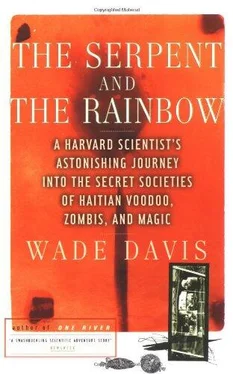Wade Davis - The Serpent and the Rainbow
Здесь есть возможность читать онлайн «Wade Davis - The Serpent and the Rainbow» весь текст электронной книги совершенно бесплатно (целиком полную версию без сокращений). В некоторых случаях можно слушать аудио, скачать через торрент в формате fb2 и присутствует краткое содержание. Год выпуска: 1985, Издательство: Simon & Schuster, Жанр: Старинная литература, на английском языке. Описание произведения, (предисловие) а так же отзывы посетителей доступны на портале библиотеки ЛибКат.
- Название:The Serpent and the Rainbow
- Автор:
- Издательство:Simon & Schuster
- Жанр:
- Год:1985
- ISBN:нет данных
- Рейтинг книги:5 / 5. Голосов: 1
-
Избранное:Добавить в избранное
- Отзывы:
-
Ваша оценка:
- 100
- 1
- 2
- 3
- 4
- 5
The Serpent and the Rainbow: краткое содержание, описание и аннотация
Предлагаем к чтению аннотацию, описание, краткое содержание или предисловие (зависит от того, что написал сам автор книги «The Serpent and the Rainbow»). Если вы не нашли необходимую информацию о книге — напишите в комментариях, мы постараемся отыскать её.
The Serpent and the Rainbow — читать онлайн бесплатно полную книгу (весь текст) целиком
Ниже представлен текст книги, разбитый по страницам. Система сохранения места последней прочитанной страницы, позволяет с удобством читать онлайн бесплатно книгу «The Serpent and the Rainbow», без необходимости каждый раз заново искать на чём Вы остановились. Поставьте закладку, и сможете в любой момент перейти на страницу, на которой закончили чтение.
Интервал:
Закладка:
We shook hands. “Mr. Davis? I’m Marna Anderson, Nate Kline’s daughter. Do come in.” She turned abruptly and led me through a corridor of clinical whiteness into a large room crowded with color. Approaching me from the head of an immense refectory table was a short man in a white linen suit and an antique vest of silk brocade.
“You must be Wade Davis. Nate Kline. I’m glad you could make it.”
There were perhaps nine people in the room, and though Kline made the obligatory introductions, it was in a manner so perfunctory as to let me know that none of them mattered. He lingered only when we reached an elderly man, sitting narrow and stiff in a corner of the room.
“I’d like you to meet one of my oldest colleagues, Professor Heinz Lehman. Heinz is the former head of psychiatry and psychopharmacology at McGill.”
“Ah, Mr. Davis,” Lehman said softly, “I am delighted that you have joined our little venture.”
“I don’t know that I have.”
“Yes, well, let us wait and see.”
Kline directed me to a sofa where three pleasant but nondescript women sat sipping cocktails, their attentions scattered. A few moments passed in gossip, and then they began to question me about my life with an enthusiasm that made me uncomfortable. As soon as I had a chance I got up and began to circulate, making my way toward the bar, where I poured myself a drink. The room was filled with art—Haitian paintings, antique games and puzzles, a Persian chest with gilt decorations, a small forest of naive early American weather vanes, iron horses poised in flight.
The lights of the city drew me out onto the balcony. Low clouds swept through the high corridors of darkness slowly dissolving the summits of the skyscrapers, and from far below came the sound of tires running over glistening pavement. Looking back through the window, I saw Kline moving vigorously about the room, ushering the last of his dinner guests to the door. His movements seemed ostentatiously virile, reminding me of the kind of elderly man who might ask you in public to place your hand on his chest to measure the strength of his heart. He seemed ill cast as a doctor, exhibiting a vanity more likely in a poet. Lehman, on the other hand—tall, thin, and frail—appeared born to be a psychiatrist, and I couldn’t help wondering what vocation he would have pursued had he lived in an earlier age, before men were prepared to yield their feelings to analysis.
Marna joined her father at the door of the apartment, linking her arm lightly in his as they said goodnight to their guests. One sensed immediately the bond between them, how they chose to act as one person, so that his glance became her gesture, which beckoned me in from the balcony.
Emptied of the other guests, the room strangely came to life. Lehman, visibly more at ease, moved to its center. He fixed me with a smile.
“Let me relieve you of any further suspense, Mr. Davis. We understand from Professor Schultes that you are attracted to unusual places. We propose to send you to the frontier of death. If what we are about to tell you is true, as we believe it is, it means that there are men and women dwelling in the continuous present, where the past is dead and the future consists of fear and impossible desires.”
I glanced at him skeptically, and then at Kline, who picked up from Lehman automatically.
“The first problem is to know when the dead are truly dead.” Kline paused, regarding me deliberately. “Diagnosing death is an age-old problem. Petrarch was nearly buried alive. It haunted the Romans. The writings of Pliny the Elder are full of reports of men rescued at the last minute from the pyre. Eventually to prevent such mishaps the emperor had to fix by law the interval between apparent death and burial at eight days.”
“Perhaps we should do the same,” interjected Lehman. “Recall the Sheffield case?”
Kline nodded, and turned back to me. “Not fifteen years ago English doctors experimenting with a portable cardiograph at the Sheffield mortuary detected signs of life in a young woman certified dead from a drug overdose.”
Lehman added with a smile, “There was an even more sensational case here in New York around the same time. A postmortem operation at the city morgue was disrupted just as the first cut was being made. The patient leapt up and seized the doctor by the throat, who promptly died of shock.”
I looked across the table at the two of them, trying to conceal a faint premonition of horror. They were both old, their voices hard and clinical. It was as if the imminent presence of death had so saturated their minds at this late point of their lives that they looked upon it as a source of amusement. I had to remind myself that these men were professionals who had earned some of the highest awards of American science.
“By definition death is the permanent cessation of vital functions.” Kline leaned back in his chair, clasping his hands and smiling. “But what constitutes cessation, and how is one to recognize the function in question?”
“Breathing, pulse, body temperature, stiffness … whatever,” I answered somewhat awkwardly, still uncertain what they were getting at.
“You can’t always tell. Breathing can occur with such gentle movements of the diaphragm as to be imperceptible. Besides, the absence of respiration may represent a suspension, not a cessation. As for body temperature, people are pulled out of frozen lakes and snowfields all the time.”
“The eyes of the dead tell you nothing,” added Lehman. “The muscles of the iris continue to contract for hours after death. Skin color can be useful….”
“Hardly in this case,” Kline interrupted, glancing at Lehman. “The pallor of death only shows up in light-skinned individuals. As for heartbeat, any drug that induces hypotension can result in an unreadable pulse. In fact, deep narcosis can manifest every symptom of death: shallow imperceptible breathing, a slow and weakened pulse, a dramatic decrease in body temperature, complete immobility.”
Kline poured himself a brandy. “‘No warmth, no breath, shall testify thou livest.’ Friar Laurence to Juliet, gentlemen. Perhaps our most famous reference to drug-induced suspended animation.”
“In fact,” Lehman concluded, “there are only two means of ascertaining death. One is by no means infallible and involves a brain scan and cardiogram. That requires expensive machinery. The other, and the only one that is certain, is putrefaction. And that requires time.”
Kline left the room and returned with a document which he presented to me. It was a death certificate in French of one Clairvius Narcisse. It was dated 1962.
“Our problem,” Kline explained, “is that this Narcisse is now very much alive and resettled in his village in the Artibonite Valley in central Haiti. He and his family claim he was the victim of a voodoo cult and that immediately following his burial he was taken from his grave as a zombi.”
“A zombi. …” A dozen conventional questions came to mind, but I said nothing more.
“The living dead,” Kline continued. “Voodooists believe that their sorcerers have the power to raise innocent individuals from their graves to sell them as slaves. It is to prevent such a fate that family members may kill the body of the dead a second time, sometimes plunging a knife into the heart of the cadaver, sometimes severing the head in the coffin.”
I looked at Kline, then back to Lehman, trying to measure their expressions. They appeared altogether complementary. Kline spoke in visions, in ideas that spun to the edge of reality. Lehman held the reins and balanced the conversation with reason. This made it that much more impressive when he too began to speak of zombis.
“The Narcisse case is not the first to come to our attention. A former student of mine, Lamarque Douyon, is currently the director of the Centre de Psychiatrie et Neurologie in Port-au-Prince. Since 1961, in collaboration with Dr. Douyon, we have been systematically investigating all accounts of zombification. For years we found nothing to them. Then came our breakthrough, in 1979, when our attention was drawn to a series of most singular cases, of which this Narcisse was only one.”
Читать дальшеИнтервал:
Закладка:
Похожие книги на «The Serpent and the Rainbow»
Представляем Вашему вниманию похожие книги на «The Serpent and the Rainbow» списком для выбора. Мы отобрали схожую по названию и смыслу литературу в надежде предоставить читателям больше вариантов отыскать новые, интересные, ещё непрочитанные произведения.
Обсуждение, отзывы о книге «The Serpent and the Rainbow» и просто собственные мнения читателей. Оставьте ваши комментарии, напишите, что Вы думаете о произведении, его смысле или главных героях. Укажите что конкретно понравилось, а что нет, и почему Вы так считаете.












